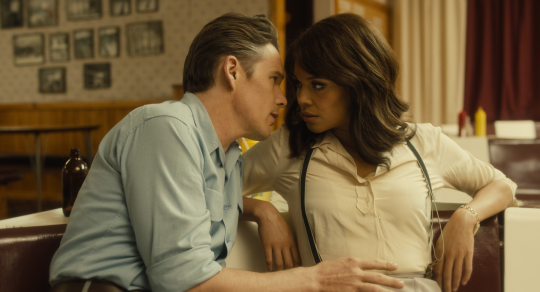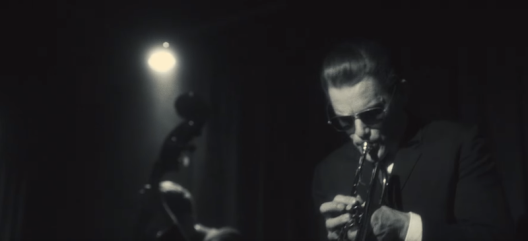Ethan Hawke’s an interesting kind of cat. You might see him in the it-took-twelve-years-to-make Boyhood, or in The Purge, or maybe fronting a documentary on his piano teacher. You just don’t know. Or you might, if you’re proximal to one of the 23 theaters it’s playing in, see him play legendary toothless Jazz trumpeter Chet Baker in Born To Be Blue.
Now, I tend to shy away from musical bios. I realized why as I was watching—and enjoying—this film: Most musical biopics want to cram the subject’s life into a 90-100 minute (or even 2.5 hour) space, and this tends to make the character seem a little bit cartoonish. Sometimes more than a little bit. What Born To Be Blue does, instead, is focus on one period of Baker’s life: The time after his release from prison (so he could be in the biopic about himself) which is immediately followed by his jaw-crushing pounding at the hands of heroin dealers or loan sharks or whatever, up to the time he had rehabilitated himself and played at Birdland.

Leaving out legendary turn as Max Schreck in “Nosferatu”.
Now, I don’t know if any of this is true. Neither do I care. (And I’m not sure if that’s a contradiction, but as I say in The Jerk review, beware of critics bearing rationales.) But it does make for a good movie, because we see his struggle with heroin addiction and general malaise while he tries to make good for the new love of his life, played by Carmen Ejogo (Away We Go, The Purge: Anarchy). There’s very little attempt to explain anything. Stuff just happens.
When the movie starts he’s shooting up with a girl after being dissed by Miles Davis, which leads to the breakup of his marriage and his heroine addiction—but then we find out (from Chet!) that that’s not true, and we’re watching Chet Baker play himself in the story of his life. His movie wife (Ejogo) is sort of flabbergasted how this Defoe-esque creature can have the sort of allure that allows him to treat women so badly and still have them follow him around—but then she ends up with him (and is the focus of the story, really). She asks him why he shoots up; he says because he likes to. Which is unilluminating to the point of being false, but the sort of thing a junkie (who doesn’t know why he shoots up either) would say.

Right before she goes from wondering “Why do women fall for him?” to “Why did I fall for him?”
When you get down to it, Chet’s not a real likable guy, and the great artistry here from writer/director Robert Budreau and Ethan Hawke, is that you kinda like him anyway. You’re rooting for him. You want a happily-ever-after for him, as we hope for all artists who seem to not be cut out for the material plane. Ejogo is also very good; she’s really the stand-in for the audience, on reflection. She’s rooting for Chet, too, treating him better than his actions might warrant, believing in him, and only wanting a modicum of what she gives back. (And generally forgiving him when he fails on that front.)
Callum Keith Rennie (Fifty Shades of Gray, Case 39) plays the producer who comes to believe in Chet again. Hardworking actor Tony Nappo (Saw V) has a nice turn as the probation officer who has to be hard-ass but is also really rooting for Baker.
The music is jazz. Modern jazz. Whatever they call it. Not the peppy, fun tunes of the 1900-1930s, but the drug-soaked, vanishes-up-its-own-ass kind of jazz that makes you want to throw a cymbal at someone’s head.

And there it goes.
It’s not bad, though. Hawke does his own singing, which is whiskey-soaked, low-key stuff, but effective. The guy who doesn’t like musical biopics says “Check it out” as does The Boy.
Oh, one thing: This is a fairly sexually explicit film. There’s not any nudity in it, that I recall, but Ethan and Carmen have a fair amount of sex where the action is explicitly detailed. It is relevant to the plot—a metaphor for Chet getting his groove back, even—but be forewarned if you plan to take your ambitious eight-year-old trumpet-playing kid with you.
